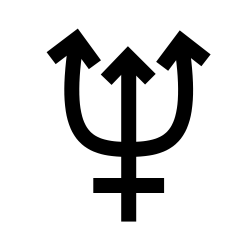Neptune
Neptune is the eighth and farthest-known solar planet from the Sun. In the Solar System, it is the fourth-largest planet by diameter, the third-most-massive planet, and the densest giant planet. It is 17 times the mass of Earth, slightly more massive than its near-twin Uranus.
Composition
Neptune is denser and physically smaller than Uranus because its greater mass causes more gravitational compression of its atmosphere. It is referred to as one of the solar system's two ice giant planets (the other one being Uranus.)
Being composed primarily of gases and liquids, it has no well-defined "solid surface." The planet orbits the Sun once every 164.8 years at an average distance of 30.1 AU (4.5 billion km; 2.8 billion mi). It is named after the Roman god of the sea and has the astronomical symbol ♆, representing Neptune's trident. A second symbol, an L-V monogram for 'Le Verrier', analogous to the H monogram ♅ for Uranus, was never much used outside of France and is now archaic.
Mythology
In Roman mythology, Neptune is the god of freshwater and the sea in Roman religion. He is the counterpart of the Greek god Poseidon. In the Greek tradition, he is a brother of Jupiter and Pluto; the brothers preside over the realms of heaven, the earthly world, and the underworld. Salacia is sometimes named as his wife.
Worship
The theology of Neptune is limited by his close identification with the Greek god Poseidon, one of many members of the Greek pantheon whose theology was later tied to a Roman deity. The lectisternium of 399 BC indicated that the Greek figures of Poseidon, Artemis, and Heracles had been introduced and worshipped in Rome as Neptune, Diana, and Hercules. It has been speculated that Neptune has been conflated with a Proto-Indo-European freshwater deity; since the Indo-Europeans lived inland and had little direct knowledge of the sea, the Romans may have reused the theology of a previous freshwater god in their worship of Neptune. Servius explicitly names Neptune as the god of rivers, springs, and waters; he may parallel the Irish god Nechtan, master of rivers and wells. This is in contrast to Poseidon, who was primarily a god of the sea.
Neptune has been associated with a number of other Roman deities. By the first century BC, he had supplanted Portunus as the god of naval victories; Sextus Pompeius called himself the "son of Neptune." For a time, Neptune was paired in his dominion of the sea with Salacia, the goddess of saltwater. Neptune was considered the legendary progenitor god of the Falisci (who called themselves Neptunia proles), joining Mars, Janus, Saturn, and Jupiter as the deific father of a Latin tribe.
Astrology
In astrology, Neptune governs the mystical realm of fantasy, illusion, and delusion. The planet is associated with intuition and spiritual enlightenment. It may also be connected to mercy and compassion. The negative aspects of Neptune are deception, trickery, deceit, guilt, and addiction. Neptune’s placement in your chart will reveal your creative gifts, and show your self-sabotaging tendencies.
It is the ruler of Pisces.
